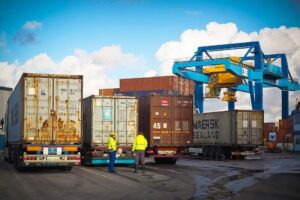In today’s interconnected world, businesses are constantly seeking efficient and cost-effective shipping methods to transport their goods across the globe. Sea freight, also known as ocean freight, has long been a popular choice for businesses due to its capacity, extensive global coverage, and competitive pricing. However, like any shipping method, sea freight comes with a set of pros and cons. In this comprehensive guide, we will delve into the pros and cons of sea freight for your business, empowering you to make informed decisions and optimize your shipping strategies.
Sea Freight Advantages
1. Cost-Effectiveness: Maximizing Your Budget
One of the significant advantages of sea freight is its cost-effectiveness, especially when dealing with large shipments or bulk goods. Compared to air freight or other expedited shipping methods, sea freight offers significantly lower shipping costs per unit, making it an attractive option for businesses aiming to maximize their budget. With proper planning and optimization, sea freight can help companies achieve substantial cost savings, particularly on long-haul and intercontinental shipments.
2. Capacity for Large Volume Shipments: Scaling Your Business
Sea freight can handle large-volume shipments, making it an ideal choice for businesses dealing with sizable inventories or bulky goods. Shipping containers, whether 20 feet or 40 feet, provide ample space to accommodate various products, ensuring efficient transportation and reduced unit costs. The scalability of sea freight allows businesses to expand their operations, fulfill bulk orders, and explore new markets, thereby enhancing their growth potential.
3. Global Connectivity: Reaching Distant Markets
With an extensive network of ports around the globe, sea freight provides unparalleled global connectivity for businesses. This connectivity enables access to multiple markets, even in remote or landlocked regions. By leveraging sea freight, companies can tap into new customer bases, establish international trade partnerships, and seize lucrative opportunities in various regions. The ability to navigate global markets efficiently is a significant advantage that sets sea freight apart from other shipping methods.
Read Also:
Top 10 Freight Forwarding Companies in South Africa
With so many logistics companies in the market nowadays, finding the right and reliable freight forwarding partner can be sometimes challenging. Especially when everyone claims... Continue Reading →

10 Top Clearing and Forwarding Companies in Kenya
Geographically located in the East African region, Kenya has recently become the business hub of Africa. Much of its economic development is due to good... Continue Reading →

Sea Freight Disadvantages
1. Longer Transit Times: Balancing Speed and Efficiency
One of the main drawbacks of sea freight is its longer transit times compared to air freight or express shipping. Sea vessels have a slower pace, requiring more time to transport goods across vast distances. Consequently, businesses that rely on time-sensitive deliveries or have urgent customer demands may find sea freight challenging to meet their requirements. Balancing the trade-off between cost-effectiveness and speed is crucial when considering sea freight as a logistics option.
2. Potential Delays and Uncertainties: Managing Shipment Risks
Sea freight is subject to various factors that may lead to delays and uncertainties during shipping processes. Adverse weather conditions, port congestion, labor strikes, or unforeseen events can disrupt schedules and impact delivery timelines. Businesses must factor in these potential risks and establish contingency plans to mitigate any adverse effects on their supply chain. Effective communication and collaboration with freight forwarders and shipping lines can help minimize disruptions and ensure smooth operations.
3. Complex Customs Procedures: Navigating International Regulations
International trade involves compliance with complex customs procedures, regulations, and documentation requirements. Sea freight shipments are no exception. They often necessitate comprehensive customs declarations, import/export licenses, and adherence to specific trade agreements. Businesses must allocate time and resources to understand and comply with these regulations to avoid costly delays or penalties. Engaging the services of experienced customs brokers or freight forwarders can help navigate the intricacies of customs procedures and ensure smooth customs clearance.
Optimizing Your Sea Freight Strategy
1. Planning and Lead Time Optimization
To maximize the benefits of your sea freight, meticulous planning is essential. Start by analyzing your shipping requirements, considering the nature of your products, volume, destination, and desired delivery timelines. By understanding your needs, you can determine the optimal lead time required for sea freight shipments and plan accordingly.
Always collaborate closely with your suppliers, manufacturers, and freight forwarders to align production schedules with shipping timelines. By providing sufficient lead time, you can secure space on vessels, avoid last-minute rush fees, and minimize the risk of delays.
Read Also:
Top Packaging Companies in Egypt
Needless to say, that in the business world, making a great first impression is crucial. And for a consumer, the packaging is often the first... Continue Reading →

2. Packaging and Container Optimization
Efficient packaging and container optimization play a vital role in sea freight. Ensure your products are well-packed to withstand the rigors of long ocean voyages. Consider other factors such as weight distribution, cushioning materials, and compliance with international packaging standards. Proper packaging protects your goods, maximizes container space utilization, and minimizes shipping costs per unit.
If your business requires smaller shipments, choosing less than Container Load (LCL) options can be cost-effective. LCL consolidates multiple shipments from different companies into one container, reducing shipping expenses. Alternatively, if you have a substantial volume, Full Container Load (FCL) may be more suitable, allowing you to use a container exclusively.
3. Choosing the Right Freight Forwarder and Shipping Line
Partnering with a reliable freight forwarder and reputable shipping line is crucial for a successful sea freight strategy. Conduct thorough research, read customer reviews, and evaluate the track records of potential partners. Look for freight forwarders experienced in sea freight logistics and customs procedures to ensure a smooth shipping experience.
Consider factors such as their network of agents, their ability to handle documentation, customs clearance expertise, and responsiveness to queries or issues. A knowledgeable freight forwarder will assist you in selecting the most suitable shipping lines, optimizing routes, and providing guidance on regulations and compliance.
4. Enhancing Supply Chain Visibility
Maintaining visibility and transparency in your supply chain is essential when utilizing sea freight. Consider implementing robust supply chain management systems and technology solutions that provide real-time tracking and monitoring capabilities. That enables you to proactively identify and address potential issues, such as delays or disruptions.
Collaborate closely with your freight forwarder to gain access to their online tracking systems or utilize global shipment tracking platforms. This visibility empowers you to keep customers informed, adjust inventory levels, and make informed business decisions based on accurate, up-to-date information.
5. Risk Management and Insurance
Mitigating risks associated with sea freight is crucial to protect your business interests. While freight forwarders and shipping lines take precautions, accidents, theft, or damage can still occur during transit. It is best to explore cargo insurance options that cover potential losses.
Evaluate the types of insurance available, such as Marine Cargo Insurance, and assess the coverage and limitations. Engage with insurance brokers in cargo insurance to determine the most suitable cover for your specific needs. Insurance not only safeguards your business financially but also provides peace of mind and confidence in your shipping operations.
Conclusion
Sea freight offers businesses multiple advantages, such as cost-effectiveness, capacity for large-volume shipments, and global connectivity. However, it is crucial to consider the potential drawbacks, including longer transit times, possible delays, and complex customs procedures. By optimizing your sea freight strategy through meticulous planning, efficient packaging, and selecting the right partners, you can navigate the challenges and harness the benefits of sea freight for your business.
Keep an eye on supply chain visibility, risk management, and continuous improvement to ensure a streamlined and successful sea freight experience. Remember, each business is unique, and it’s crucial to evaluate your specific requirements, objectives, and constraints when determining the suitability of sea freight for your business.
Discover more on AFRIKTA:
Combine Cargo Malawi Ltd
Combine Cargo Malawi (Ltd) is the fastest growing company offering world-class Freight Management Services across the globe. Our Vision: To be the company of choice... See Full Profile →

Perseus Forwarders Kenya
Perseus Forwarders is a company providing logistics services in transport, customs & project freight forwarding in Mombasa, Kenya | East Africa & DRC. With established... See Full Profile →

Manica Freight Services
Manica Freight Services has a distinct history in the maritime agency, shipping and freight transport market. Our extensive service in Mozambique covers the areas of... See Full Profile →

Trans-Tech Logistics
Trans-Tech Logistics is a specialized freight & logistics company based in Southern Africa. We offer comprehensive integrated and total freight transportation solutions from collection, clearance... See Full Profile →


